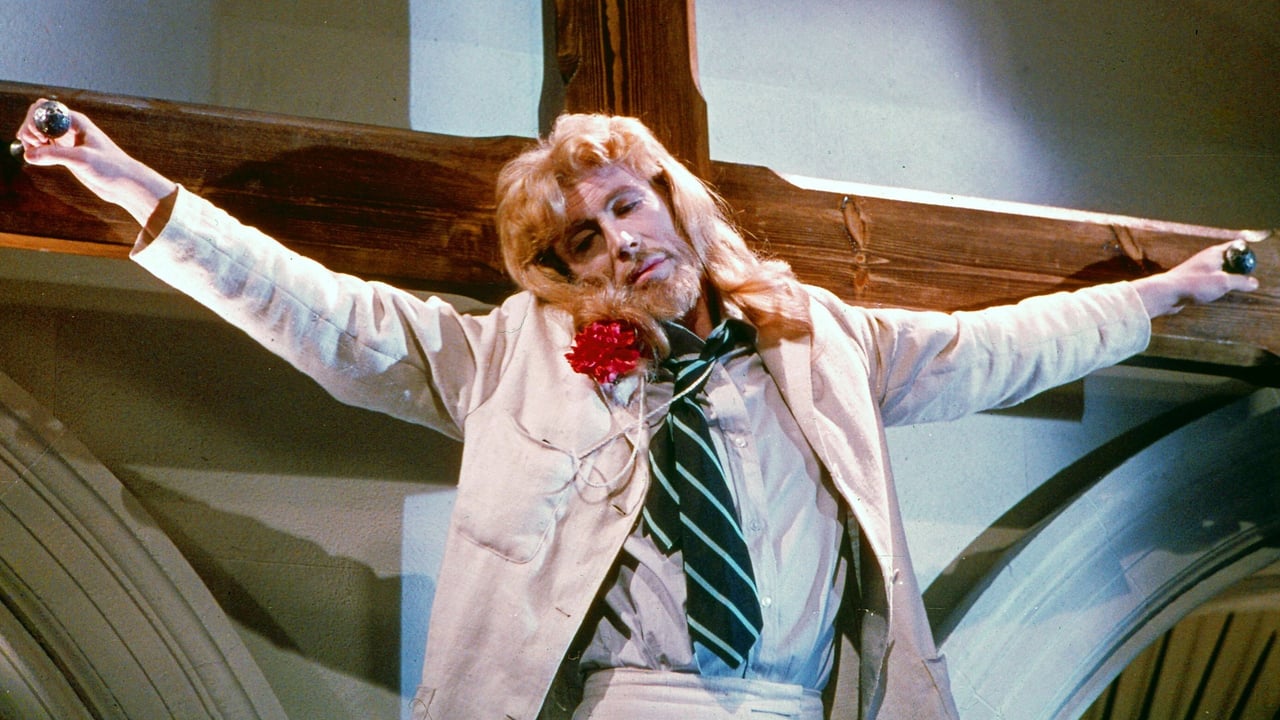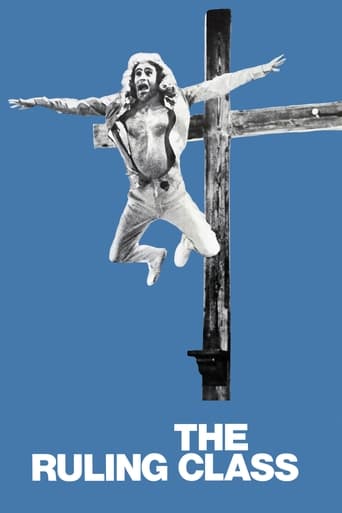Lovesusti
The Worst Film Ever
Phillida
Let me be very fair here, this is not the best movie in my opinion. But, this movie is fun, it has purpose and is very enjoyable to watch.
justincward
'Kind Hearts and Coronets' meets 'If...'.Peter O'Toole gives a masterclass as a well-depicted paranoid schizophrenic who thinks he's God, inherits an Earldom and is 'cured' by the superb Michael Bryant's psychiatrist, only to become Jack the Ripper in the House of Lords.The anti-establishment message is battered home with a 15lb sledgehammer, but the cast of English (and most of the Scottish) movie stalwarts at least have a good time. Partly stagey, partly like avant-garde television of the time, and partly 'Gosford Park', TRC is not to be watched for anything other than to see actors having a terrific romp.No story, no meaningful social/religious/moral comment, just great actors (and crew) doing a great job with a somewhat ropey playscript. Special mentions for Carolyn Seymour, Michael Bryant, Arthur Lowe, Nigel Green and of course Alastair Sim wiping the floor with the lot of them. Oh, and the quintessential James Villiers idiotic toff performance.
MartinHafer
"The Ruling Class" is a film that is sure to offend--after all, the leading man (Peter O'Toole) thinks he is Jesus! Right away, this sort of idea eliminates many potential viewers who would just be too offended to see such a film--especially with scenes where O'Toole climbs up on a giant cross in his house in order to meditate or take a nap. Additionally, the film nails the final nails in the coffin of the traditional English class system--and probably offended quite a few tradition-bound Brits as well. As for me, I was less offended (especially in its skewering of the upper class) but more bothered because the execution of the plot left a bit to be desired. Specifically, it was overlong and overly indulgent.The film begins with the Earl of Gurney accidentally hanging himself while having a rant--during which he was wearing a tutu! Obviously, the guy was NOT in his right mind. However, his heir (O'Toole) is 100% bonkers--and thinks he's Jesus! Considering he's got a seat in the House of Lords the family thinks this is a serious problem! But they also want to have an heir and so they trick the new Earl into a marriage and a child is soon produced. Now that the heir is here, the family will either have O'Toole committed or cure him--they don't care which--they just know they can't have a loony representing the family in the House! The film has a lot to like. I love how, for absolutely no reason, the cast members periodically break into song and dance numbers. I also like the general premise that the monarchy has long outlived its usefulness. Finally, the Butler is wonderful, as once he inherits his fortune he doesn't care one bit about propriety and tells EVERYONE exactly what he'd been hiding all those years--and delivers some very funny lines. But, I also feel irritated that such a lovely idea is, at times, squandered because the film just goes on and on and on and on. Someone really needed to look at this film and make a few judicious cuts here and there or say 'enough' when it lost momentum because scenes were just overdone or lacked comedic timing. This is especially true near the end--a portion that should have taken about ten minutes but took 40! And, frankly, the Jack the Ripper angle was handled in a very, very unfunny way--and it could have been hilarious. Overall, an interesting and compelling failure.By the way, the Rorschach cards used by the psychiatrist in the film are two of the actual cards from this test. It's rare to see real cards in films or TV.
SHAWFAN
Despite this film's age (38 years and counting) when I saw it last night this was the first time I had ever seen it. I immediately added it to my list of the greatest movies of all time. Its mixtures of genres while highly unusual are not unrepresented elsewhere: Dr. Strangelove, Monty Python, Rocky Horror, etc., would seem to fill in its category with other examples of the combination of social satire, psychological horror, off-the-wall musical numbers, etc.But what really makes this film so special is of course Peter O'Toole himself. This has to be his greatest role as an actor and would have been the same for any other actor who might have succeeded in bringing it off so brilliantly as O'Toole did. Could anyone else have done it? Peter Sellers? Richard Burton? Laurence Olivier? Perhaps the latter had O'Toole's versatility to be able to go from one bizarre attitude to another without incongruity or the slightest skip of a beat. But I don't think Olivier was ever offered such a marvelous actor's showoff role as this.But among the fifty or so critiques of this incomparable, stunning, and never-to-be-forgotten film which I read on your site, none referred to the very possible antecedent to Peter Barnes' play and movie, the celebrated Italian playwright Luigi Pirandello's play Henry IV, which also posited an insane monarch imagining himself to be a character out of history and the attempts of the monarch's relatives to cope with the situation.
spanishflea50
Firstly I would like to say that i adore the way almost every aspect of this film. It is extremely witty (witness the oft quoted line from O'Toole about why he thinks he is God) and also very touching (Jack's joy when he marries his wife for example) and it's songs are great and very nicely integrated. The one area where I think it fails is as a satire against the ruling classes. The idea that the aristocracy is uncomfortable with non comformity or uncontrolled emotion is neither original nor reserved solely for that strata of society. This does not mean that the film lacks depth however and I found myself extremely troubled by the film's observation that the world is more tolerant of excessive coldness than excessive love. At times I feel that the film could work as a parable to the release of Barrabas and the crucifixtion of Christ. Perhaps this is to read too much into it but I urge everyone to watch the film and ponder it for themselves.

